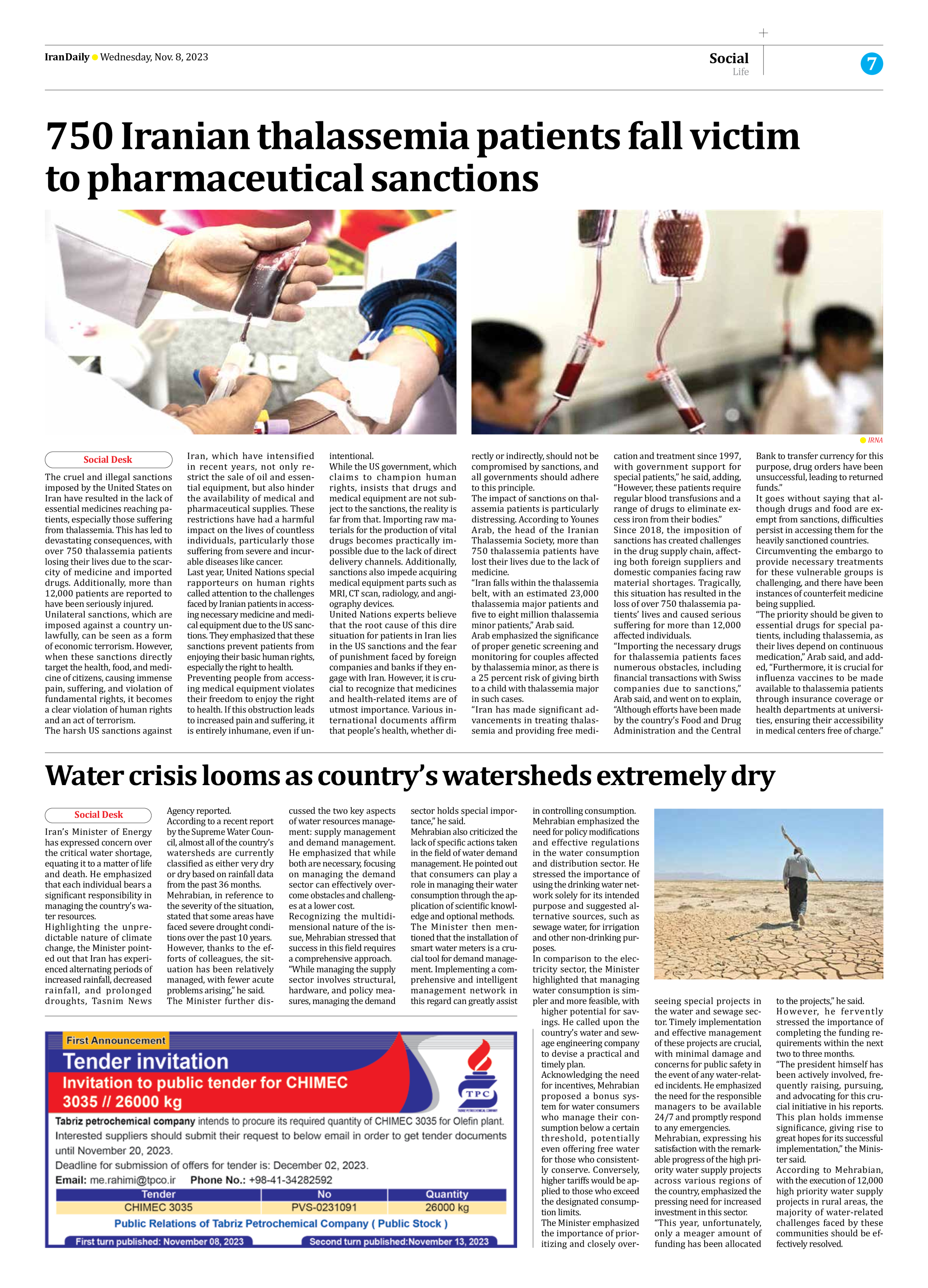
750 Iranian thalassemia patients fall victim to pharmaceutical sanctions
The cruel and illegal sanctions imposed by the United States on Iran have resulted in the lack of essential medicines reaching patients, especially those suffering from thalassemia. This has led to devastating consequences, with over 750 thalassemia patients losing their lives due to the scarcity of medicine and imported drugs. Additionally, more than 12,000 patients are reported to have been seriously injured.
Unilateral sanctions, which are imposed against a country unlawfully, can be seen as a form of economic terrorism. However, when these sanctions directly target the health, food, and medicine of citizens, causing immense pain, suffering, and violation of fundamental rights, it becomes a clear violation of human rights and an act of terrorism.
The harsh US sanctions against Iran, which have intensified in recent years, not only restrict the sale of oil and essential equipment, but also hinder the availability of medical and pharmaceutical supplies. These restrictions have had a harmful impact on the lives of countless individuals, particularly those suffering from severe and incurable diseases like cancer.
Last year, United Nations special rapporteurs on human rights called attention to the challenges faced by Iranian patients in accessing necessary medicine and medical equipment due to the US sanctions. They emphasized that these sanctions prevent patients from enjoying their basic human rights, especially the right to health.
Preventing people from accessing medical equipment violates their freedom to enjoy the right to health. If this obstruction leads to increased pain and suffering, it is entirely inhumane, even if unintentional.
While the US government, which claims to champion human rights, insists that drugs and medical equipment are not subject to the sanctions, the reality is far from that. Importing raw materials for the production of vital drugs becomes practically impossible due to the lack of direct delivery channels. Additionally, sanctions also impede acquiring medical equipment parts such as MRI, CT scan, radiology, and angiography devices.
United Nations experts believe that the root cause of this dire situation for patients in Iran lies in the US sanctions and the fear of punishment faced by foreign companies and banks if they engage with Iran. However, it is crucial to recognize that medicines and health-related items are of utmost importance. Various international documents affirm that people’s health, whether directly or indirectly, should not be compromised by sanctions, and all governments should adhere to this principle.
The impact of sanctions on thalassemia patients is particularly distressing. According to Younes Arab, the head of the Iranian Thalassemia Society, more than 750 thalassemia patients have lost their lives due to the lack of medicine.
“Iran falls within the thalassemia belt, with an estimated 23,000 thalassemia major patients and five to eight million thalassemia minor patients,” Arab said.
Arab emphasized the significance of proper genetic screening and monitoring for couples affected by thalassemia minor, as there is a 25 percent risk of giving birth to a child with thalassemia major in such cases.
“Iran has made significant advancements in treating thalassemia and providing free medication and treatment since 1997, with government support for special patients,” he said, adding, “However, these patients require regular blood transfusions and a range of drugs to eliminate excess iron from their bodies.”
Since 2018, the imposition of sanctions has created challenges in the drug supply chain, affecting both foreign suppliers and domestic companies facing raw material shortages. Tragically, this situation has resulted in the loss of over 750 thalassemia patients’ lives and caused serious suffering for more than 12,000 affected individuals.
“Importing the necessary drugs for thalassemia patients faces numerous obstacles, including financial transactions with Swiss companies due to sanctions,” Arab said, and went on to explain, “Although efforts have been made by the country’s Food and Drug Administration and the Central Bank to transfer currency for this purpose, drug orders have been unsuccessful, leading to returned funds.”
It goes without saying that although drugs and food are exempt from sanctions, difficulties persist in accessing them for the heavily sanctioned countries.
Circumventing the embargo to provide necessary treatments for these vulnerable groups is challenging, and there have been instances of counterfeit medicine being supplied.
“The priority should be given to essential drugs for special patients, including thalassemia, as their lives depend on continuous medication,” Arab said, and added, “Furthermore, it is crucial for influenza vaccines to be made available to thalassemia patients through insurance coverage or health departments at universities, ensuring their accessibility in medical centers free of charge.”







